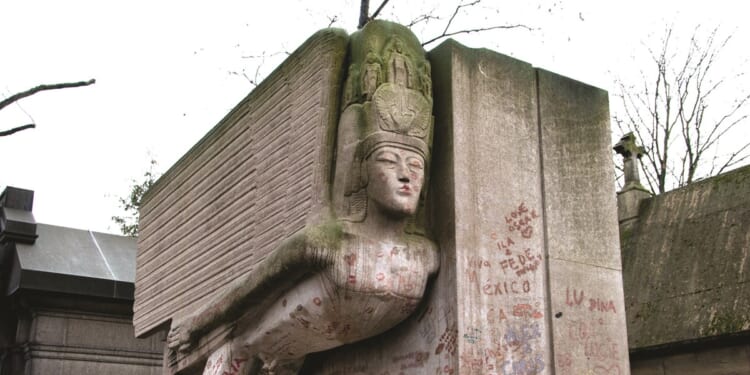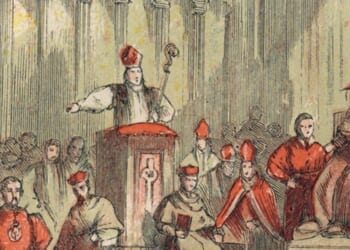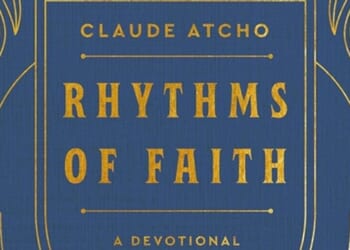AS OSCAR WILDE lay dying in a squalid hotel room in Paris on 28 November 1900, deserted by most of his former friends and admirers and ostracised by respectable society, an old and trusted associate sent for a priest. On arrival, the priest asked Wilde whether he wished to be received into the Roman Catholic Church. Wilde held up his hand, and, on this sign, Fr Cuthbert Dunne gave him conditional baptism, and then absolved and anointed him.
Wilde had always been attracted to the liturgical rituals of Rome, once declaring that “Catholicism is the only religion to die in.” Despite his inclinations, however, he never took the final step towards full reception. Now, when he was beyond speech and barely conscious, sacred oils were applied to his hands and feet, and solemn words were spoken. Wilde died two days later.
Moments after his final breath, his body exploded, and fluids poured from several orifices — proof, no doubt, to his religious detractors of the divine wrath occasioned by a morally wretched life. In America alone, between 1895 and 1900, some 900 sermons inveighed against Wilde’s conspicuous sins. Only 14 mourners attended his burial.
TIMES change, and so do moral conventions. Wilde’s brilliance as a conversationalist, playwright, celebrity, and wit is now widely acknowledged. His novel The Picture of Dorian Gray, condemned in his own day as poisonous, is now an A-level set text. His trial and imprisonment in 1895 for “gross indecency” have turned him into a secular martyr: humiliated, punished cruelly, physically broken, and finally abandoned by those who could not tolerate his homosexuality.
A recent biographer declares that “Among British writers, Wilde stands with Shakespeare and Jane Austen.” If his best writings have been upheld by time, there remain the questions of his controversial life and character that contributed to his ultimate downfall, and the extent to which his notional hold on Christianity ever amounted to more than a matter of taste.
FROM his early years, Wilde was deeply influenced by his mother, Jane. His father, William, did teach him to fish, but it was Jane’s presence and opinions — rebellious, extravagant, and firmly of the view that she had been an eagle in a previous existence — that would prove decisive. Not herself a Roman Catholic, she is believed to have had Oscar baptised as a child; his father (an agnostic Protestant and a Freemason) threatened to disinherit him if he embraced Catholicism, although this did not cure him of his interest in the faith.
Jane’s ambition was “to rage through life”. She was above respectability, and once advised a youth, “When you are as old as I, young man, you will know there is only one thing in the world worth living for, and that is sin.”
Oscar was always mindful of this precept. After taking the gold medal in Greek at Trinity College, Dublin, in 1874, he gained entry to Oxford by winning a prestigious scholarship after equivocating about his real age. His marked intention was “to burn with one clear flame”. John Ruskin became his intimate friend, and the books of Newman — along with a copy of Thomas à Kempis’s Imitation of Christ — became his travelling companions. Wilde never met Newman, but contemplated the possibility of an interview, “merely to be in the presence of that divine man”.
A top First in Finals, combined with the Newdigate Prize for Poetry, raised the possibility of an Oxford Fellowship, but no offer came. Undeterred, Wilde headed to London, which was followed by a long lecturing tour of the United States, to pursue “success: fame, or even notoriety”. Eventually, all three came to pass, as a mesmerised and sometimes baffled public pondered his flamboyant clothes of velvet and silk, and his biting cleverness with words and epigrams.
RESTRAINT, decorum, and convention held no interest for Wilde; hypocrisy, even less. In contrast, the point of life was to live ecstatically through artistic expression and the pursuit of beauty. In 1884 — beguiled chiefly by her quietness — he married Constance Lloyd, and designed her wedding dress.
The marriage produced two children, but Wilde became bored, and eventually sought out new sexual experiences that culminated in a passionate but doomed relationship with Lord Alfred Douglas. An Oxford undergraduate, “Bosie” (as Douglas was known to his friends) would develop a sexual predilection for working-class boys, an interest bordering on an obsession which Wilde came to share — “feasting with panthers”, as he would later describe it in De Profundis, a work of contrition written in his prison cell.
During his imprisonment, Wilde was permitted books: the Bible, and Bunyan’s Pilgrim’s Progress came as standard fare, but he also requested and received books by Newman, Augustine, and Pascal. Surprising, perhaps, but a reminder that this was the same man who, notwithstanding the promiscuous adventures that proved so damaging to himself and others, had written The Soul of Man Under Socialism, an essay published in 1891 in which Wilde adopted Jesus as a symbol of human flourishing in a society based on co-operation instead of competition. Did he really believe in this vision of a world in which other lives really mattered and Christianity was essential for the common good?
FOR all the ease with which Wilde sacrificed relationships when they no longer interested him, or exploited others through his delirious recklessness, he was also generous and kind, and capable of empathy in the face of hardship or sorrow. A spendthrift, he died penniless but, on a freezing night, gave his overcoat to a homeless man on the street.
Driven by impulses he failed to control, he understood the immensity of grief, and proved a help to others who mourned. Always the centre of attention, while believing that “the greatest men fail, or seem to have failed,” he found success vulgar, and longed for the social change that would banish mediocrity and Victorian censoriousness.
HAD Wilde’s father allowed him to become a practising Roman Catholic much earlier in his life, Wilde believed that it was possible that “the artistic side of the Church and the fragrance of its teaching would have cured my degeneracies.” He did manage to kneel before priests in England and France, and even before the Pope in Rome. He also believed that the Roman Catholic Church was “for saints and sinners alone. For respectable people the Anglican Church will do.”
There, his orthodoxy ceased. He did not regard Christ as divine, doubted the veracity of Catholic teaching, and anticipated “tremendous passions in the next world” — a desire perhaps, on his part, for sublime consolation after the unmitigated humiliations of his final years.
Canon Rod Garner is an Anglican priest, writer, and theologian.
His latest book, Reappraisals: Lives less ordinary (Liverpool Hope University Press 2025), is now available on Amazon.

















